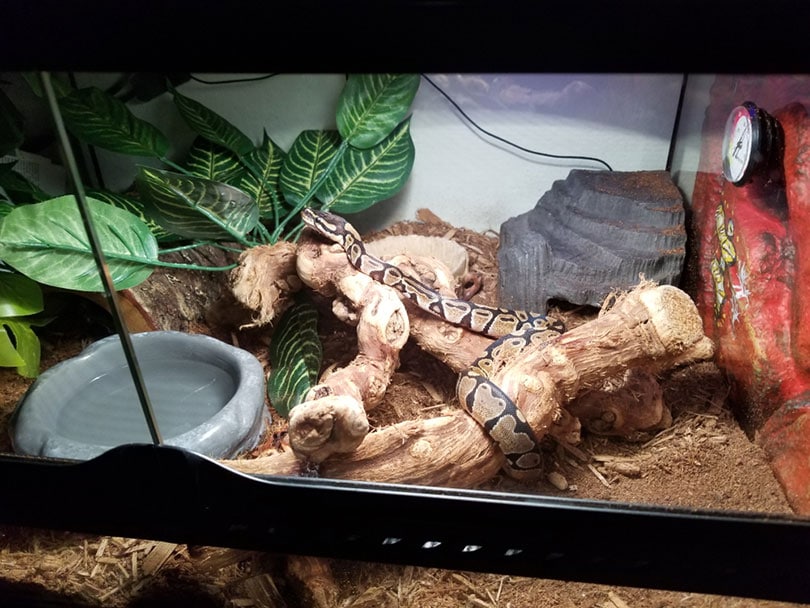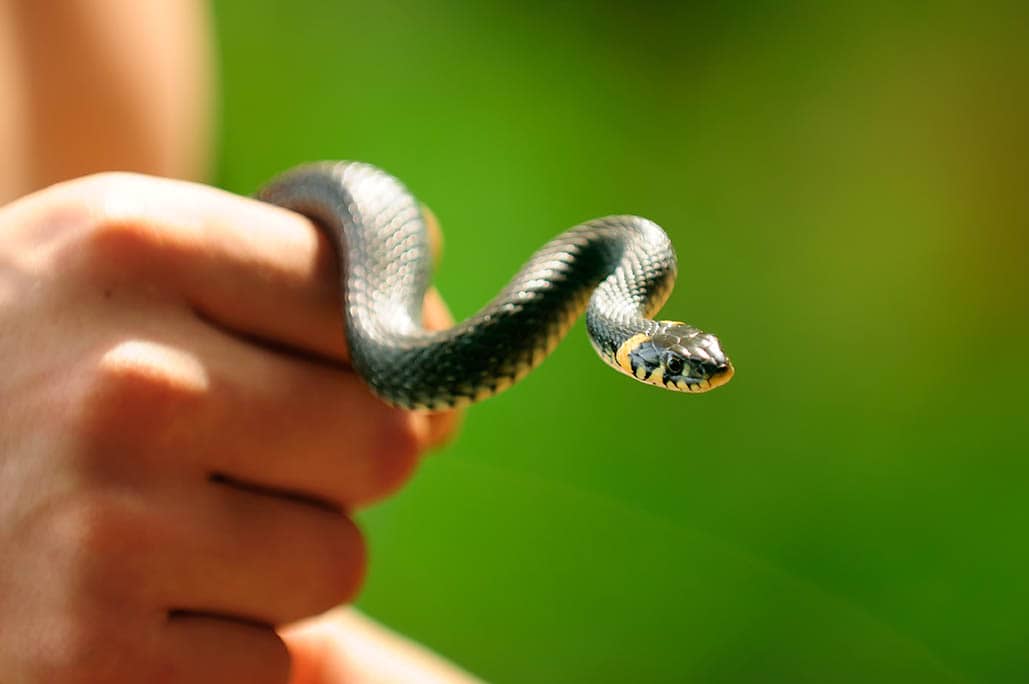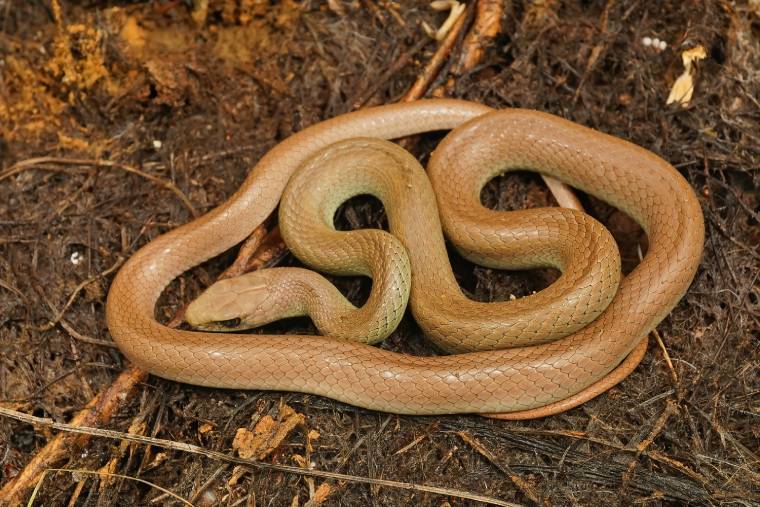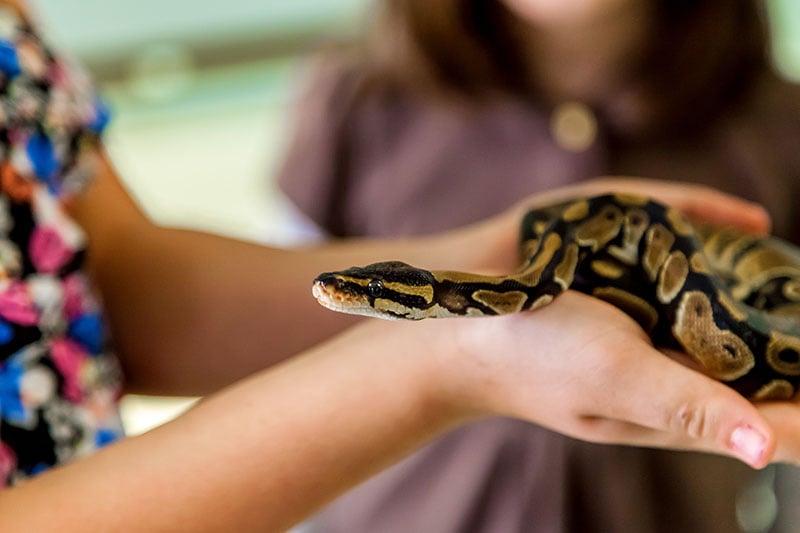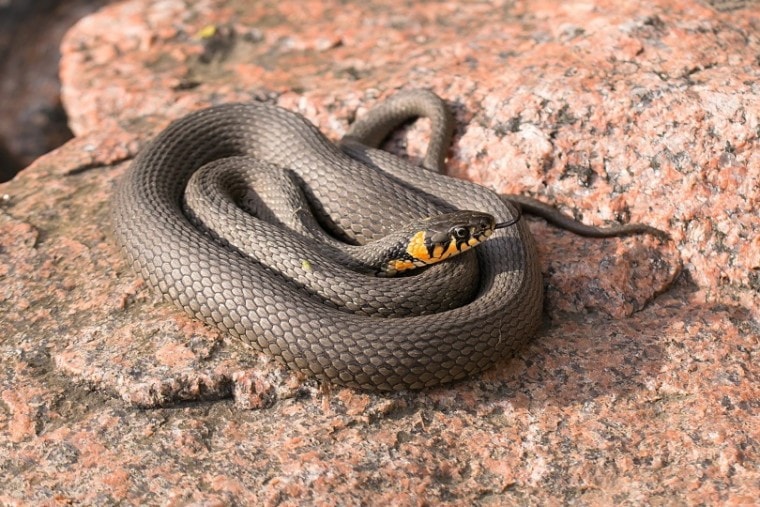
Long, slithery, and slender, snakes aren’t cute and cuddly animals, but they can make fantastic pets for the right person. Pet snakes are exotic reptiles that require experienced owners. Snakes can live for decades and require consistent care and attention. If you’re thinking about adding this fascinating animal to your household, here is everything that you need to know about caring for them.
Snake Facts
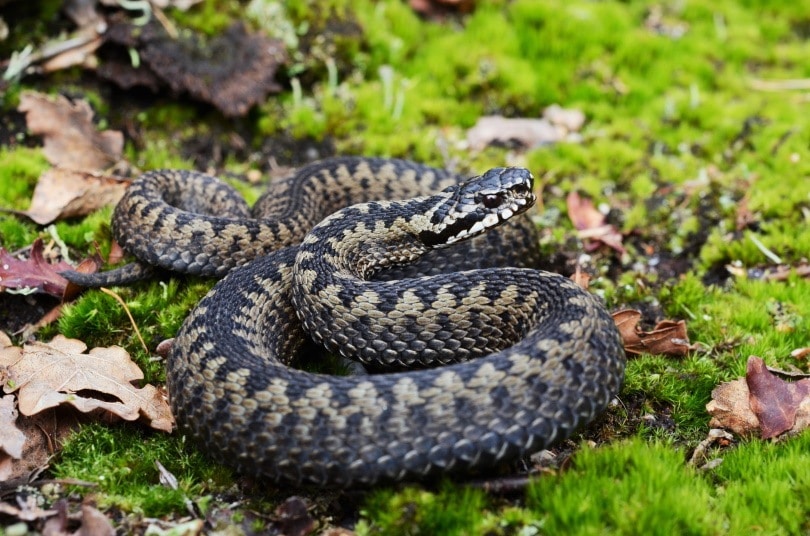
Are Snakes Good Pets?
Please note that many states and jurisdictions may have legislation that prohibits owning, breeding, purchasing, or selling snakes or certain snake species. Always make sure you have permission to legally own an exotic pet before deciding to adopt one. If you are in the U.S., please refer to your state’s laws before adopting an exotic pet. If you live elsewhere, refer to the relevant laws where you reside.
Capturing wild animals to keep as pets is not advised, as this disrupts local ecosystems. Releasing exotic pets back into the wild is not advised either, as this can also disrupt the balance of local ecosystems.
A snake is a long-term commitment and is generally not considered safe around children. They are also not compatible with other pets, including cats, dogs, birds, rabbits, and other exotic pets. They are opportunistic hunters that may attempt to strike or constrict anything that they perceive as a potential meal, including their handlers.
While buying a snake may seem appealing, these animals don’t make good starter pets. Moreover, they aren’t suited for people seeking social and loving companions. If you can’t stomach even the idea of feeding dead or live animals to your pet, a snake isn’t right for you.
However, for some people, snakes can make excellent pets. These reptiles are often misunderstood and can be an amazing stress reliever for many folks. They do not require daily walks and are super quiet. Their cages are also easy to clean.
Snakes can live for decades. This is why routine health visits with a qualified vet are essential. Most species also need temperatures of 80°F to 85°F (26.7°C to 29.4°C) to live comfortably.
If you’re not able to provide the proper health and environmental upkeep to your pet for many years, a snake may not be the right pet for you.
Where Can I Get a Pet Snake?

You can buy or adopt a pet snake at a local pet store or a reptile store or from a qualified and reputable exotic animal dealer or breeder. You can also visit a snake or reptile expo in your area to meet other snake enthusiasts and find more exotic types of snakes for sale.
How Much Does It Cost to Own a Pet Snake?
Snakes aren’t inexpensive animals to buy or care for. Still, if you are serious about owning a pet snake, you need to be ready and willing to spend the money that they need to thrive.
A snake will cost around $75 or more for the animal themselves. Some snake species can cost thousands of dollars, depending on their rarity. The price of snake care will vary depending on the type of snake that you choose to buy. For instance, owning a garter snake might be more affordable than owning a python. Also, depending on where you live, the license to keep a snake will be another cost that you will incur.
The general costs of snake ownership include:
The total annual costs for snake ownership will fall between $450 and $1,500. Please note that these figures are just estimates.
What Kind of Home Does My Pet Snake Need?

Snakes need large, clear terrariums that accommodate their size. A 20-gallon tank is good for a small snake. The lid should be screened for ventilation. Snakes are amazing escape artists, so always remember to place a secure lid on top of the snake tank.
Line the bottom of the tank with an appropriate substrate for the species that you adopt: Dry leaves, sand, bark mulch, or newspaper will enable your pet snake to burrow and hide.
Snakes are cold-blooded animals and need a climate-controlled habitat in order to stay healthy. An under-tank heating pad is a good option for most snake owners. However, this shouldn’t cover the entire area of the tank. Your snake should always have access to both a warm and cool area in their enclosure. You can also opt for overhead bulbs. Whatever heating method you choose, be sure to monitor the tank temperatures carefully with gauges and thermometers.
You’ll also need to keep the tank humid. Low humidity will make it tough for your pet snake to shed their old, dead skin. Spray the interior of the tank with a mister every day. Large water bowls and moistened moss will also add humidity to the tank. Keep track of the humidity levels with a hygrometer.
Snakes enjoy their privacy, especially when they’re shedding. Provide your pet snake a cave or shelter where they can retreat to when needed.
What Should I Feed My Pet Snake?
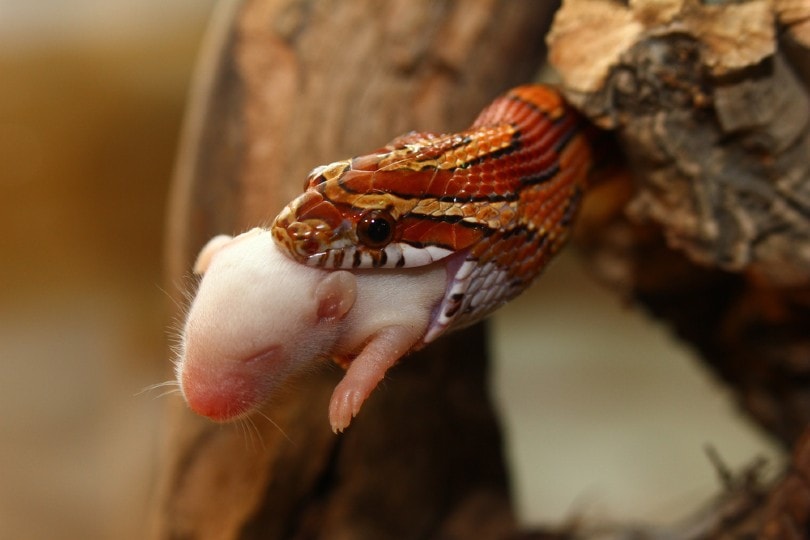
Snakes are carnivores, meaning they only eat meat. Feeding will depend upon the type of snake that you buy. For instance, some snakes will eat frozen baby mice, while others will dine on large rats. Before you get a pet snake, do your homework on the specific needs of the breed that you want to bring home.
Please note that live prey are usually not advised, as they can injure your snake when they attempt to defend themselves, leading to wounds that can become complicated if they’re not addressed by a veterinarian promptly.
All snakes need access to fresh, clean water. Keep a deep bowl of water in your snake’s cage. Change the water daily.
How Do I Take Care of My Pet Snake?

While snakes aren’t social or trainable critters the way that dogs or cats are, you should make it a point to interact with yours every day, though the frequency depends on the species. You can allow your pet snake to drape over your shoulders or coil around your arm. Don’t ever allow a loose snake to be unsupervised, though. Never allow your pet snake to interact with other pets, especially tiny animals.
Don’t handle your snake right after they’ve eaten. If your children are handling your pet snake, keep a close eye on them. Teach them how to properly and gently hold and handle the reptile.
How Do I Know If My Pet Snake Is Sick?
To keep your pet snake healthy, it’s essential that you schedule a wellness appointment with a qualified exotic animal vet every 6 months.
Although snakes in captivity will live for many years, they can still suffer from certain health issues. The most common is the failure to eat or thrive. This is generally caused by stress, such as the snake’s tank being at an improper temperature.
Snakes can also develop swollen jaws, blisters, burns, abscesses, swollen or cloudy eyes, and discolored patches. If you notice any of these signs, schedule a vet appointment right away.
- Related Read: Do Snakes Fart? Vet-Approved Facts & FAQ
Final Thoughts
Pet snakes are best suited for experienced owners. They need the proper tank and temperature conditions in order to flourish. If you feel ill just thinking about feeding one kind of animal to another, a snake isn’t the right pet for you. Moreover, if you want a social, cuddly pet, don’t get a pet snake.
But if you have the experience, dedication, and proper education, a pet snake can make the perfect pet.
Featured Image Credit: Jarkko Mänty, Pixabay




